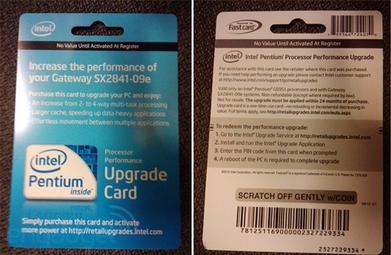TheLostSwede
News Editor
- Joined
- Nov 11, 2004
- Messages
- 18,663 (2.48/day)
- Location
- Sweden
| System Name | Overlord Mk MLI |
|---|---|
| Processor | AMD Ryzen 7 7800X3D |
| Motherboard | Gigabyte X670E Aorus Master |
| Cooling | Noctua NH-D15 SE with offsets |
| Memory | 32GB Team T-Create Expert DDR5 6000 MHz @ CL30-34-34-68 |
| Video Card(s) | Gainward GeForce RTX 4080 Phantom GS |
| Storage | 1TB Solidigm P44 Pro, 2 TB Corsair MP600 Pro, 2TB Kingston KC3000 |
| Display(s) | Acer XV272K LVbmiipruzx 4K@160Hz |
| Case | Fractal Design Torrent Compact |
| Audio Device(s) | Corsair Virtuoso SE |
| Power Supply | be quiet! Pure Power 12 M 850 W |
| Mouse | Logitech G502 Lightspeed |
| Keyboard | Corsair K70 Max |
| Software | Windows 10 Pro |
| Benchmark Scores | https://valid.x86.fr/yfsd9w |
Back in September 2021, reports about Intel working on something called SDSi or software defined silicon, started to appear. Now, over a year later, the company has finally launched its SDSi products under the Intel On Demand branding. Back then, we speculated about what features Intel would put behind a paywall and although we were somewhat off track, Intel has put some specific "instructions" behind the paywall on the supported Xeon processors. Specifically, some CPUs will have Quick Assist, Dynamic Load Balancer and Data Streaming Accelerator available as an On Demand feature. Additionally, Intel is also putting its Software Guard Extensions and In-Memory Analytics Accelerator behind the same pay wall.
It appears that these features will be offered as-a-service offering from some of Intel's service partners, but there's also a "one-time activation of select CPU accelerators and security features" according to the Intel On Demand website. It's unclear which Xeon SKUs will get Intel On Demand, but according to The Register, it'll be the upcoming Sapphire Rapids based Xeon processors which should be the first parts affected. Intel has listed partners like HP, Lenovo and SuperMicro, among others, that are involved with the Intel On Demand program. It will still be possible to buy next gen Xeon CPUs that are fully feature enabled like today, but it's unclear if the Intel On Demand Xeon SKUs will offer some kind of cost benefits to companies that don't need the additional features that are behind the paywall.


View at TechPowerUp Main Site | Source
It appears that these features will be offered as-a-service offering from some of Intel's service partners, but there's also a "one-time activation of select CPU accelerators and security features" according to the Intel On Demand website. It's unclear which Xeon SKUs will get Intel On Demand, but according to The Register, it'll be the upcoming Sapphire Rapids based Xeon processors which should be the first parts affected. Intel has listed partners like HP, Lenovo and SuperMicro, among others, that are involved with the Intel On Demand program. It will still be possible to buy next gen Xeon CPUs that are fully feature enabled like today, but it's unclear if the Intel On Demand Xeon SKUs will offer some kind of cost benefits to companies that don't need the additional features that are behind the paywall.


View at TechPowerUp Main Site | Source



